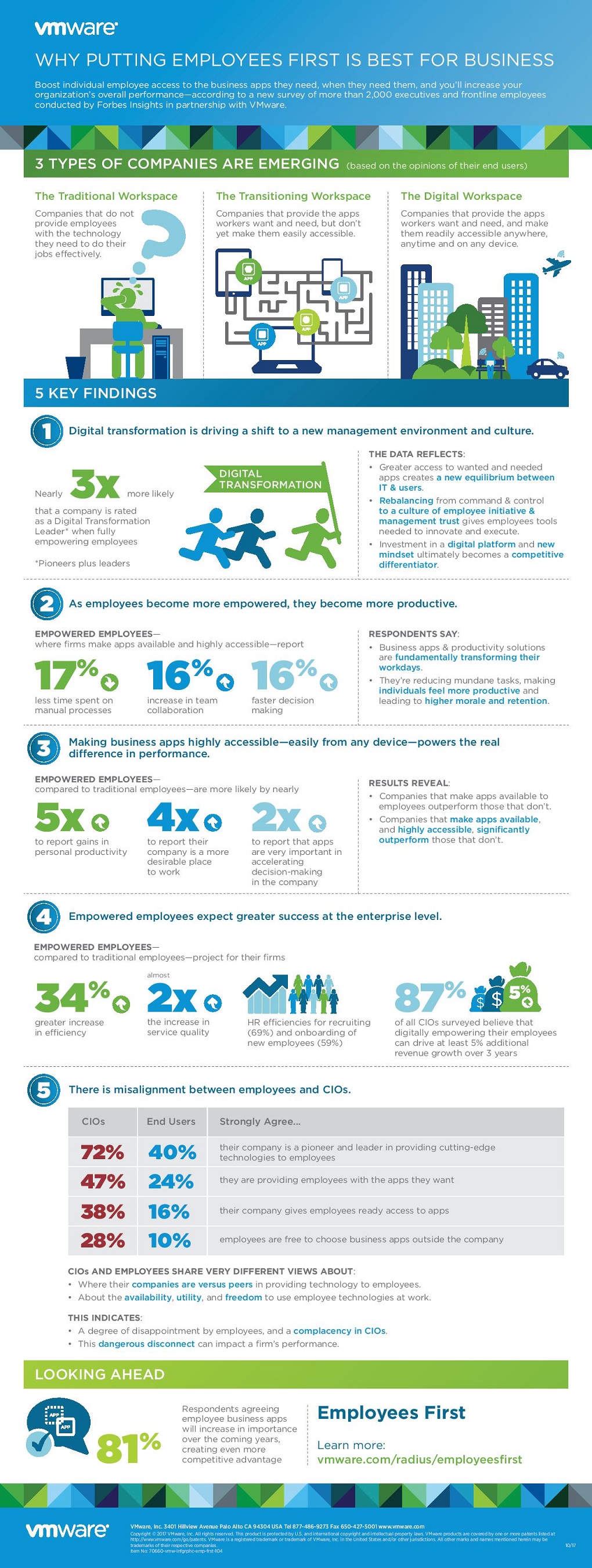Companies that empower employees with the applications they want and need, and make them readily accessible — anytime, anywhere, on any device — can benefit from measurable gains at the individual and organizational level, according to a survey, The Impact of the Digital Workforce: A New Equilibrium of the Digitally Transformed Enterprise, conducted by VMware.
While empowering employees with technology choice translates to superior enterprise performance, the report also found a dangerous disconnect between the perception employees and CIOs have on the availability, utility, and freedom to use employee technologies in the workplace.
Digital Transformation Driving Shift to New Management Environment and Culture
The empowerment of employees — by granting them greater access to the apps they prefer and need to do their job — can create a new equilibrium between IT and users. By empowering employees, companies self-identified as digital leaders are migrating to a business powered by employee initiative and management trust.
■ Companies that give employees ready access to the apps they need are nearly three times as likely to be rated leaders in digital transformation by their employees compared to companies that do not (81 percent versus 31 percent).
■ Employees in companies that are lagging in digital transformation (followers) are 10 times more likely to say that they don't have ready access to the apps that they need to do their jobs right compared to companies that empower their employees (2 percent versus 22 percent).
Empowered Employees Become More Productive
Business applications and productivity solutions are driving a fundamental transformation in the individual employee's workday. This includes faster decision making, increased productivity, better collaboration, and higher job satisfaction. Empowered employees (those whose firms make apps available and highly accessible) report that:
■ They spend 17 percent less time on manual processes.
■ Their team collaboration has increased by 16 percent.
■ Decision-making has been sped up by 16 percent.
Making Apps Highly Accessible — Easily from Any Device — Powers the Real Difference in Performance
Companies that make apps available and highly accessible to employees outperform those that do not. Empowered employees compared to traditional employees are:
■ Almost five times more likely to report gains in personal productivity (63 percent versus 14 percent).
■ Nearly twice as likely to report that apps are very important in accelerating decision-making in the company (77 percent versus 39 percent).
■ Nearly four times more likely to report that their company has been made a more desirable place to work (55 percent versus 14 percent).
Empowered Employees Produce Greater Business Success
Employee-level actions sum up to superior enterprise performance. With empowered employees come increases in efficiency, service quality, and potential for success in recruitment of talent.
■ Empowered employees project greater increase in efficiency (34 percent) for their firms compared to traditional employees.
■ Empowered employees report almost double the increase in service quality compared to traditional employees (17 percent versus 9 percent).
■ The HR function is improved with most respondents reporting it was "very important" for them to be empowered with cloud and mobile business applications for recruiting (69 percent) and onboarding of new employees (59 percent).
■ Majority of all CIOs (87 percent) believe that revenue can increase by more than 5 percent over three years when employees are empowered.
Misalignment Between Employees and CIOs
Difference in perception on the availability, utility, and freedom to use technologies in the workplace can create a disconnect that can impact recruitment, collaboration, and morale.
■ 72 percent of CIOs believe their company is a pioneer and leader in providing cutting-edge technologies to employees — only 40 percent of employees do.
■ 47 percent of CIOs strongly believe they are providing their employees with the apps/tools they need to do their jobs — only 24 percent of employees strongly agree.
■ 38 percent of CIOs strongly believe that they provide the needed access to enterprise apps — only 16 percent of employees strongly agree.
Methodology: The findings in the report are based on a survey of 2,158 executives, divided equally between CIOs and end-users of business applications and productivity solutions. All respondents were from companies with annual revenue of over $250 million, with average revenue of $4.3 billion. Survey respondents were drawn from 16 countries in North America, Asia-Pacific, and Western Europe. Respondents represented more than 12 industries, with no industry composing more than 20 percent of the total sample. The non-CIO respondents were drawn from multiple parts of the enterprise, including operations, sales, finance, HR, and executive management. The survey was conducted from June to August of 2017 by Forbes Insights, in collaboration with VMware.


